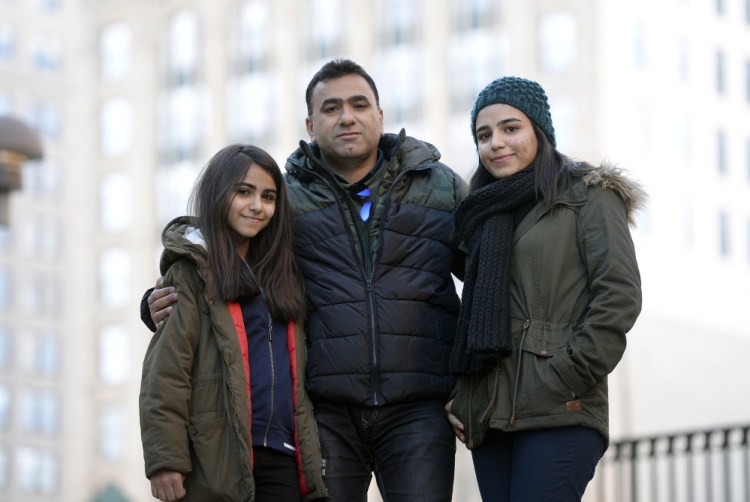What should have been the excitement of long-held dreams of coming to America finally being fulfilled has turned into a nightmare for an Iraqi family newly arrived in Maine.
Labed Alalhanfy, 49, and his wife, Soso, and two daughters, Jumana, 19, and Omaima, 13, arrived Tuesday in New Jersey from Baghdad and flew into Portland the next day. They were excited to be free from the threat they faced because of Alalhanfy’s ties to the United States through his work as an interpreter for the U.S. Army and other U.S. agencies and to discover a new life in Maine.
They were eagerly awaiting the arrival of their third daughter, Bananh, 20, a student at the American University in Iraq, within days. Then on Friday, President Trump ordered the U.S. closed to all refugees for 120 days while a new system is set up to tighten vetting for those from predominantly Muslim countries. The order placed a temporary entry ban on citizens from seven countries: Iraq, Iran, Syria, Yemen, Sudan, Libya and Somalia.
“She is now very anxious and scared,” Alalhanfy, who described his family as secular Muslims, said of Bananh.
Bananh did not accompany her family to the U.S. because her parents and sisters had a deadline for leaving Iraq and she didn’t receive her visa until this month and therefore needed more time before she could depart.
The family said they do not know what to do to get their daughter out of Iraq, where she is not safe. They left the country in the middle of the night, informing only very close family members of their plans.
“The neighbors will start to notice. People will start questioning, especially because she is female. It is a critical situation,” Alalhanfy said in an interview Saturday.

Labed Alalhanfy talks with a reporter during an interview on Saturday.
Alalhanfy said it took him awhile to decide to leave Iraq, holding out hope that there would be a future for him and his family. But in 2013, when it became clear that the future would not work out, he applied for a special immigrant visa and began to look for a new life in the United States as their life in Iraq became increasingly unbearable.
Last summer the family was granted their visas and they secretly started planning their exit.
When they flew out of Iraq last week, they gave up good jobs. Jumana abandoned her studies to become a laser engineer. Omaima left all of her close middle school friends without being able to say goodbye.
They left everything but clothes and photographs behind in their spacious home surrounded by private gardens.
Now they are living in Portland with Alalhanfy’s brother, Aqeel Mohialdeen, an Iraqi immigrant and editor-publisher of Maine’s first Arabic-language newspaper, The Hanging Gardens of Babylon.
Alalhanfy and his wife do not have jobs or a permanent place to live. They are hoping to find an apartment through Catholic Charities Maine, the Portland agency that helps settle new immigrants.
Alalhanfy said they have been in constant touch with Bananh since Trump’s order – intended to protect the U.S. from terrorism – was issued. He said that of all his daughters, she is the most Americanized.
“Her English is perfect and she knows a lot about American values,” he said.
Alalhanfy said a country should be allowed to defend itself against terrorists, but it is unfair to put all people in one category.
“There are people who are innocent, who are victims of terrorists,” he said.
Mohialdeen said he doesn’t understand why the seven countries made Trump’s list but not the countries of origin of the Sept. 11 terrorists, who were from Saudi Arabia, Egypt, Lebanon and the United Arab Emirates.
The latest issue of The Hanging Gardens of Babylon features a front page photo of Omaima, taken last fall when she was still in Iraq. She is holding an American flag while making a peace sign against a presidential election backdrop.
Mohialdeen said Omaima’s photograph was an act of courage and allegiance to the United States.
“How brave is that! To me that is a kind of faithful loyalty,” said Mohialdeen.
Send questions/comments to the editors.



